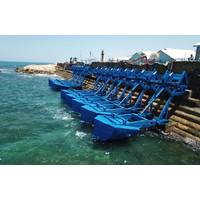Europe's Gas Imports to Grow 50 pct by 2030
Europe's gas imports seen at 370 bln tonnes/year by 2030. Russian share of European market to remain at a third; North America to become world's largest gas producer.
Europe's imports of natural gas will surge 50 percent by 2030 as domestic production diminishes and liquefied natural gas (LNG) supplies increase, analysts at Wood Mackenzie said on Thursday.
Europe's gas imports will increase to 370 billion tonnes a year by 2030 from the current level of 250 billion tonnes, the research group said in a report.
In general, Europe's demand for gas will rise slowly until around 2025 due to competition from low coal prices and renewables overcapacity, a separate study showed on Wednesday.
Europe gets around a third of its gas from Russia. Other sources include Norway and LNG imports, mainly from the Middle East.
"There are around 150 billion cubic metres of LNG projects under development - and potentially more being developed in the U.S. - which will come to market before 2020," Massimo Di-Odoardo, principal analyst for European gas and power, told Reuters.
"We don't think there is enough additional Asian LNG demand to absorb all this and much of that will need to be imported in liquid European hubs," he added.
RELIANCE ON RUSSIA
Europe's reliance on Russian gas will remain, despite EU efforts to become less dependent on Moscow in light of the Ukraine crisis.
"Declining indigenous production and the lack of material pipeline alternatives will inevitably result in renewed reliance on Russian gas imports post-2020," Di-Odoardo said.
Although Russia's share of the European gas market should go down to around 25 percent by 2020 due to an expected glut of LNG, it will recover by 2030 to its current share of around 33 percent, Di-Odoardo added.
In a dispute over prices, Russia's Gazprom had been threatening to cut off Ukraine's gas, with potential knock-on effects for the European Union because much of the gas it receives from Russia is pumped via Ukraine.
On Wednesday, Ukraine rejected a Russian offer of a cut in duty to resolve the argument but further negotiations could take place by telephone before Monday, when Moscow has threatened to halt supplies.
Russia's seizure of Crimea and its threat to cut off gas to Ukraine have revived calls to reduce the European Union's reliance on Russian gas but the bloc's options are costly, such as the construction of LNG import terminals in the Baltic states or tapping east Mediterranean gas.
In contrast to Europe, North America will become energy-independent by 2018 as exports exceed imports, according to Wood MacKenzie.
Its gas production will double to 1 billion tonnes a year by 2030 from levels seen at the beginning of its shale gas boom in 2005.
North America's gas output will overtake that of Russia and the Caspian Sea by 2018 and it will be the largest gas-producing region in the world by 2030, the report said.
By Nina Chestney

